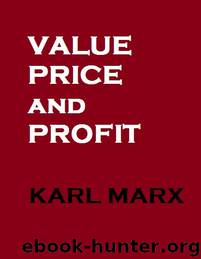Value, Price and Profit by Karl Marx

Author:Karl Marx [Marx, Karl]
Language: por
Format: epub, mobi
Tags: General Fiction
Published: 2011-05-10T00:00:00+00:00
* * *
VII. Labour Power
Having now, as far as it could be done in such a cursory manner, analyzed the nature of value, of the value of any commodity whatever, we must turn our attention to the specific value of labour. And here, again, I must startle you by a seeming paradox. All of you feel sure that what they daily sell is their Labour; that, therefore, Labour has a price, and that, the price of a commodity being only the monetary expression of its value, there must certainly exist such a thing as the value of labour. However, there exists no such thing as the value of labour in the common acceptance of the word. We have seen that the amount of necessary labour crystallized in a commodity constitutes its value. Now, applying this notion of value, how could we define, say, the value of a ten hours working day? How much labour is contained in that day? Ten hours' labour.
To say that the value of a ten hours working day is equal to ten hours' labour, or the quantity of labour contained in it, would be a tautological and, moreover, a nonsensical expression. Of course, having once found out the true but hidden sense of the expression “value of labour,” we shall be able to interpret this irrational, and seemingly impossible application of value, in the same way that, having once made sure of the real movement of the celestial bodies, we shall be able to explain their apparent or merely phenomenal movements.
What the working man sells is not directly his labour, but his labouring power, the temporary disposal of which he makes over to the capitalist. This is so much the case that I do not know whether by the English Laws, but certainly by some Continental Laws, the maximum time is fixed for which a man is allowed to sell his labouring power. If allowed to do so for any indefinite period whatever, slavery would be immediately restored. Such a sale, if it comprised his lifetime, for example, would make him at once the lifelong slave of his employer.
One of the oldest economists and most original philosophers of England — Thomas Hobbes — has already, in his Leviathan, instinctively hit upon this point overlooked by all his successors. He says: “the value or worth of a man is, as in all other things, his price: that is so much as would be given for the use of his power.” Proceeding from this basis, we shall be able to determine the value of labour as that of all other commodities.
But before doing so, we might ask, how does this strange phenomenon arise, that we find on the market a set of buyers, possessed of land, machinery, raw material, and the means of subsistence, all of them, save land in its crude state, the products of labour, and on the other hand, a set of sellers who have nothing to sell except their labouring power, their working arms
Download
This site does not store any files on its server. We only index and link to content provided by other sites. Please contact the content providers to delete copyright contents if any and email us, we'll remove relevant links or contents immediately.
| Anarchism | Communism & Socialism |
| Conservatism & Liberalism | Democracy |
| Fascism | Libertarianism |
| Nationalism | Radicalism |
| Utopian |
The Secret History by Donna Tartt(19088)
The Social Justice Warrior Handbook by Lisa De Pasquale(12190)
Thirteen Reasons Why by Jay Asher(8909)
This Is How You Lose Her by Junot Diaz(6886)
Weapons of Math Destruction by Cathy O'Neil(6279)
Zero to One by Peter Thiel(5801)
Beartown by Fredrik Backman(5754)
The Myth of the Strong Leader by Archie Brown(5507)
The Fire Next Time by James Baldwin(5444)
How Democracies Die by Steven Levitsky & Daniel Ziblatt(5218)
Promise Me, Dad by Joe Biden(5153)
Stone's Rules by Roger Stone(5087)
A Higher Loyalty: Truth, Lies, and Leadership by James Comey(4962)
100 Deadly Skills by Clint Emerson(4925)
Rise and Kill First by Ronen Bergman(4788)
Secrecy World by Jake Bernstein(4753)
The David Icke Guide to the Global Conspiracy (and how to end it) by David Icke(4717)
The Farm by Tom Rob Smith(4509)
The Doomsday Machine by Daniel Ellsberg(4490)
